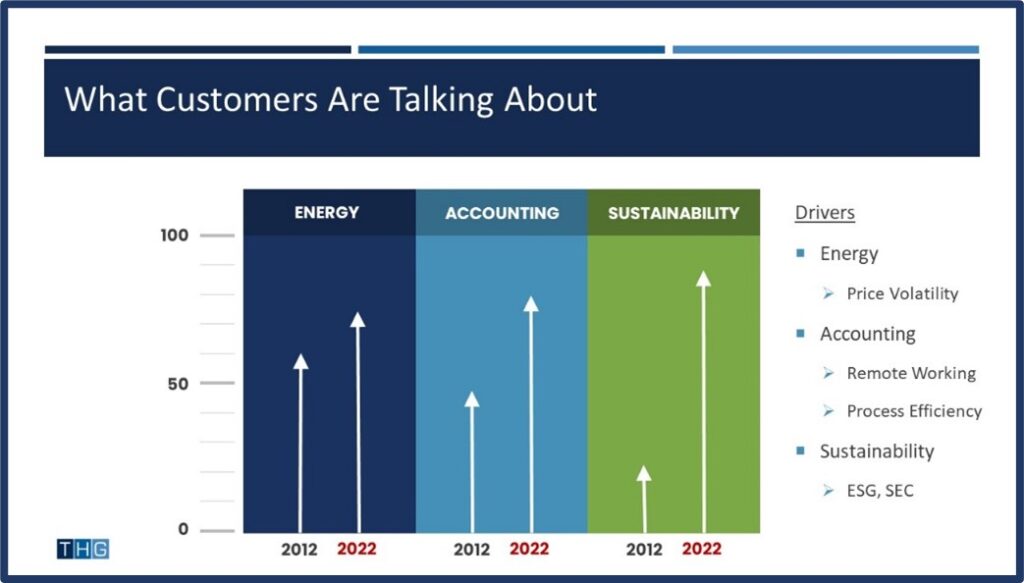GHG Reporting and Compliance
The Opportunity of The Decade for Energy Suppliers and Advisors
What’s up for debate: Broad ESG Reporting Compliance and Uncertainty
Let’s start with a quick and pragmatic history of our ESG/GHG experience:
Seven years ago, THG Energy released the first version of our GHG reporting and compliance capabilities. The customer indifference and lack of interest was deafening. Change started slowly at first, driven by large client supply chain integration and broad investor and stakeholder sentiment toward ESG reporting. In March of 2022, the Securities and Exchange Commission launched a public engagement process around its reporting mandate, making it clear that companies and publicly traded institutions will soon have to embrace and adopt carbon accounting reporting standards. There remains significant debate and discussion around indirect (Scope 3 – “value/supply chain”) emission materiality, reporting, and compliance. Broader Environmental Social Governance (ESG) policies and practices will ebb and flow for the next 10 years by industry and by individual company. That’s to be expected for board-driven social and governance topics. It’s easy to get pulled down into the ESG rabbit hole and lose your bearings. It looks like the SEC may offer some initial latitude on Scope 3 reporting requirements, as well as Social and Governance components of ESG. However, data sources for Scope 1 and Scope 2 emissions reporting are much easier to obtain.
The SEC knows that almost all companies receive monthly utility bills – the building blocks of Scope 1 & 2 reporting.
What’s NOT up for debate: GHG Scope 1 & 2 Reporting and Compliance
The GHG Protocol Corporate Accounting and Reporting Standard provides requirements and guidance for companies and other organizations preparing a corporate-level GHG emissions inventory. A recent World Economic Forum survey identified that ninety percent of companies and institutions do not have enterprise capabilities to efficiently gather required GHG data.
Over the past three years, THG has worked closely with many clients on streamlined and cost-effective implementation of GHG reporting. THG’s carbon accounting solution provides auditable, measurable, and verifiable data necessary for completing scope 1 and 2 emissions reporting.
THG’s primary role is to help strategic partners adopt and expand service offerings in the energy transition. Our private labeled energy management and sustainability platforms help secure long-term client relationships, expand offerings, and drive revenue growth.
Why is this important for Energy Managers, Suppliers, and Consultants?
 GHG reporting data starts by gathering energy and utility data for Scope 1 (direct/on-site) energy consumption and Scope 2 emissions (indirect/purchased grid electricity). THG supports grid-average emission reporting (location-based, eGRID) and custom reporting as a result of purchasing efforts (market-based) that can include supplier-specific emissions, renewable energy purchases, green tariffs, renewable energy certificates, solar and wind PPAs, and on-site solar or other renewable DERs. These actions are closely related to energy purchasing and contracting and have quickly become a primary component for all energy supply and procurement strategies. If energy suppliers and advisors can’t help quantify or don’t understand these requirements, they are facing replacement and extinction.
GHG reporting data starts by gathering energy and utility data for Scope 1 (direct/on-site) energy consumption and Scope 2 emissions (indirect/purchased grid electricity). THG supports grid-average emission reporting (location-based, eGRID) and custom reporting as a result of purchasing efforts (market-based) that can include supplier-specific emissions, renewable energy purchases, green tariffs, renewable energy certificates, solar and wind PPAs, and on-site solar or other renewable DERs. These actions are closely related to energy purchasing and contracting and have quickly become a primary component for all energy supply and procurement strategies. If energy suppliers and advisors can’t help quantify or don’t understand these requirements, they are facing replacement and extinction.
THG is sponsoring a series of webinars and discussions around GHG reporting and compliance. If you want to discuss the emerging opportunities around advanced energy management and sustainability, please reach out to us!
